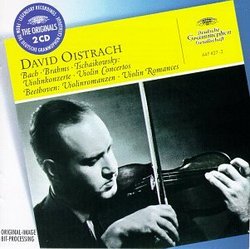| All Artists: Johann Sebastian Bach, Ludwig van Beethoven, Johannes Brahms, Pyotr Il'yich Tchaikovsky, Eugene Goossens, Franz Konwitschny, Georg Fischer, Vienna Symphony Orchestra, Royal Philharmonic Orchestra, Dresden Staatskapelle Title: David Oistrakh Members Wishing: 1 Total Copies: 0 Label: Deutsche Grammophon Release Date: 1/23/1996 Genre: Classical Styles: Forms & Genres, Concertos, Historical Periods, Baroque (c.1600-1750), Classical (c.1770-1830), Modern, 20th, & 21st Century, Instruments, Strings Number of Discs: 2 SwapaCD Credits: 2 UPC: 028944742725 |
Search - Johann Sebastian Bach, Ludwig van Beethoven, Johannes Brahms :: David Oistrakh
 | Johann Sebastian Bach, Ludwig van Beethoven, Johannes Brahms David Oistrakh Genre: Classical
|
Larger Image |
CD Details |
CD ReviewsA fabulous and affordable collection 07/27/1999 (5 out of 5 stars) "Oistrakh often seems to be unjustly ranked below many western violinists in the hierarchy of this century's great musicians. Oistrakh combines technical facility comparable to that of Heifetz with a nobility of feeling seen in only a small handfull of musicians. Moreover, he retains something seldom seen since the turn of the century--personality. His performances are loaded with deeply personal musical understanding and delightful affectation. At the same time, he never seems to lose touch with the music itself in the search for a personal interpretation. Unlike all too many modern performances, the playing here is never tasteless, never contrived. Rather, it comes straight from the soul of one of this century's finest musicians. All of these performances are among the finest I've heard." King David Brian H. Williams | Manteca, CA United States | 09/14/2001 (5 out of 5 stars) "Oistrakh, that great Russian violinist of sentiment and technical prowess is shown at his best in this collection. The Heifetz/Reiner version of Brahms on RCA seems to be the most famous, but this performance by Oistrakh and Konwitschny is better. Oistrakh has much more heart than Heifetz. Heifetz has always been cold blooded. If you want warmth and sentiment, Oistrakh is your man. Oistrakh also has a Brahms concerto with Klemperer, in stereo. If you must have one in stereo, the one with Klemperer will suffice, since Oistrakh's performance with Szell has not yet been issued on cd. The Beethoven romances are filled with such warmth and emotion, it's bound to give you goose bumps. The Tchaikovsky is also played in the grand, warm Oistrakh manner. Once you hear Oistrakh's deep sense of emotion, you will be hard pressed hearing it by others. There are many good performances, but get Oistrakh's. You'll be glad you did." Very nice set, but the Brahms is outstanding Jeffrey Lee | Asheville area, NC USA | 08/13/2004 (5 out of 5 stars) "Though I usually prefer a bit more briskness in the faster movements, the Bach pieces for both single and double violins are given fine performances. Especially lovely is the Oistrakhs' reading of the adagio in BMV 1043. Thankfully, the sound does not exhibit the kind of steeliness or stridency fairly often characteristic of other Baroque and Early Classical period recordings....The two Beethoven Romances with Eugene Goossens and the Royal Philharmonic are given expectedly warm, songful readings.
On disc two, the Tchaikovsky Concerto is not as well recorded as the Brahms (discussed later). In comparison, it sounds just a tad boxy and muddy, but it's still decent. At various times in the first movement the pace is a bit slow, with Konwitschny sharing the responsibility. Overall, though, it's a nice performance, with the last movement being particularly enjoyable. This said I still prefer Oistrakh's stereo reading with Ormandy. My absolute favorite is the stunning Heifetz/Reiner. The biggest attention getter for me in this compilation is the Brahms Concerto. The obvious comparison is with Oistrakh/Klemperer. For quite some time I have considered that performance among the finest---and I still do. But I do not get as much satisfaction from it as this one (in very fine mono) with Konwitschny conducting the Dresden Staatskapelle. One key reason is that Oistrakh is miked closer than he is with Klemperer. I hear more of his violin, and it sounds wonderful. A sense of warmth and richness is more apparent. Oistrakh seems more relaxed as well. With Klemperer, by comparison, he seems less attuned to beauty, more business-like and slightly restless. With Konwitschny, he seems to be enjoying more thoroughly what he is doing, more focused on making music as opposed to just playing notes. Hear how he brings more suppleness and sensitivity to the adagio. Indeed, throughout the entire performance he is no less virtuostic than he is with Klemperer yet he seems more able to let his emotions speak with greater expressiveness. Though I still enjoy the Oistrakh/Klemperer performance with its more massive and powerful orchestral approach, it is this one with Oistrakh/Konwitschny, along with the very different Heifetz/Reiner conception, that sits at the top of my list of favorites in this magnificent work." |

 Track Listings (11) - Disc #1
Track Listings (11) - Disc #1